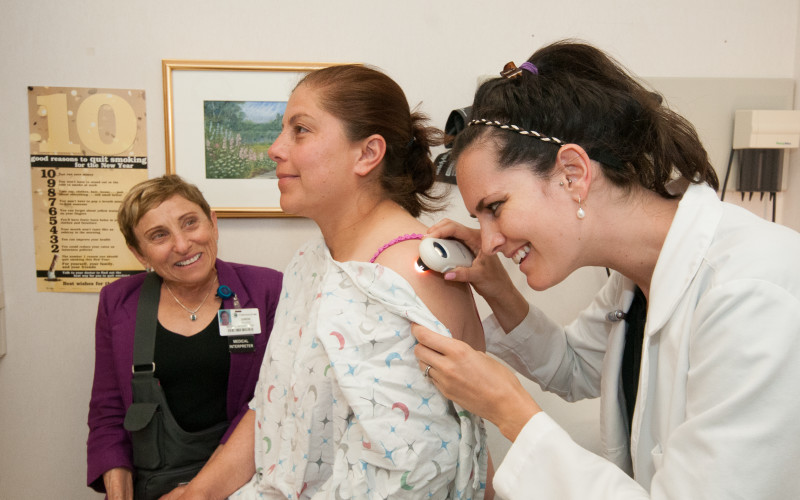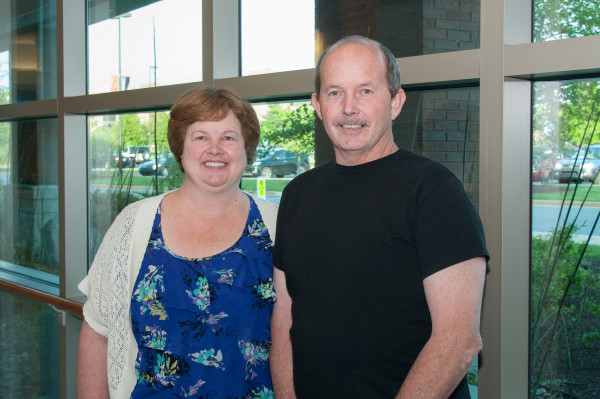Free skin cancer screenings offer education and early detection

Ed Cluesman had a spot on his nose that didn’t go away. His sister, Jeanna Chubbs, had a similar mark on her cheek.
“I worked in the sun for many years,” said Cluesman, 53, of Lewes.
“And I had a very bad sunburn when I was 16, the type of sunburn that puts people in the hospital,” said Chubbs, 51, of Newark.
Longtime exposure to sun and a history of burns are both risk factors for skin cancer. The siblings also have fair skin, light hair, blue or green eyes and a family history of melanoma, which also are risk factors.
Chubbs encouraged her brother to join her at a free skin cancer screening at the Helen F. Graham Cancer Center & Research Institute at Christiana Care Health System. Brother and sister were examined by dermatologists, who concluded the spots look suspicious and referred them for biopsies.

“We are so glad we had this checked out,” she said. “Now we can move forward and take care of this problem.”
For the past 25 years, Christiana Care and the Academy of Dermatology have partnered to offer screenings to help people get diagnosed early, when melanoma is highly curable. In all, 132 individuals were screened at the event at the Graham Cancer Center. Of that number, 58 were referred for follow-up visits, including 11 people who do not have insurance.
For some people, screening is a lifesaver. Diagnoses of melanoma, the deadliest form of skin cancer, were 23 percent higher in Delaware than the national average from 2006-2010, according to the Centers for Disease Control and Prevention. About 3.5 million cases of skin cancer are diagnosed each year in the U.S.
Maria Guadalupe Castillo and her daughter Maria Torres are Latinas with brown eyes and dark hair. But that does not mean they are immune to the harmful rays of the sun. People of any ethnicity can develop skin cancer. So mother and daughter came together to be screened.
“I worked with plants in a nursery and spent a lot of time in the sun,” said Maria Castillo, speaking through Maria Ines Lapeyre, a Christiana Care interpreter. “I noticed I got a lot more freckles on my arms.”
Like many of the people who were screened at the event, the women do not have health insurance. Education and outreach workers at the Graham Cancer Center ensure access to care, connecting individuals who need follow-up treatment, regardless of their insurance status or ability to pay.
Participants also learn ways to prevent skin cancer, such as applying liberal amounts of sunscreen once every two hours and avoiding tanning beds. They receive free samples of sunscreen and Frisbees that turn pink in the sun, reminding people playing outdoors to protect their skin.
“You also need to use a lip balm, with an SPF of 15,” said Nora Katurakes, RN, MSN, OCN, manager of Community Health Outreach and Education at the Graham Cancer Center. “And when you put on sunscreen, don’t forget to dab some on your ears, because they can get burned, too.”
Health care providers who volunteered their time and expertise included: Jessica Borderieux, PA-C; Stephanie Carlino, PA-C; Gwen, Dalphon, PA-C; Matthew Hanson, M.D.; Dawn Hirokawa, M.D.; Helen Mashek, M.D.; Rachel Neumoyer, NP; Lori Spencer, M.D.; Peter Panzer, M.D.; and Cynthia Webster, M.D. Volunteers also included members of the Delaware Diamond Chapter of the Oncology Nursing Society, students from Delaware Technical Community College and Christiana Care Volunteers. Moving for Melanoma of Delaware also was a partner for the event. Educational materials were obtained from the American Academy of Dermatology.